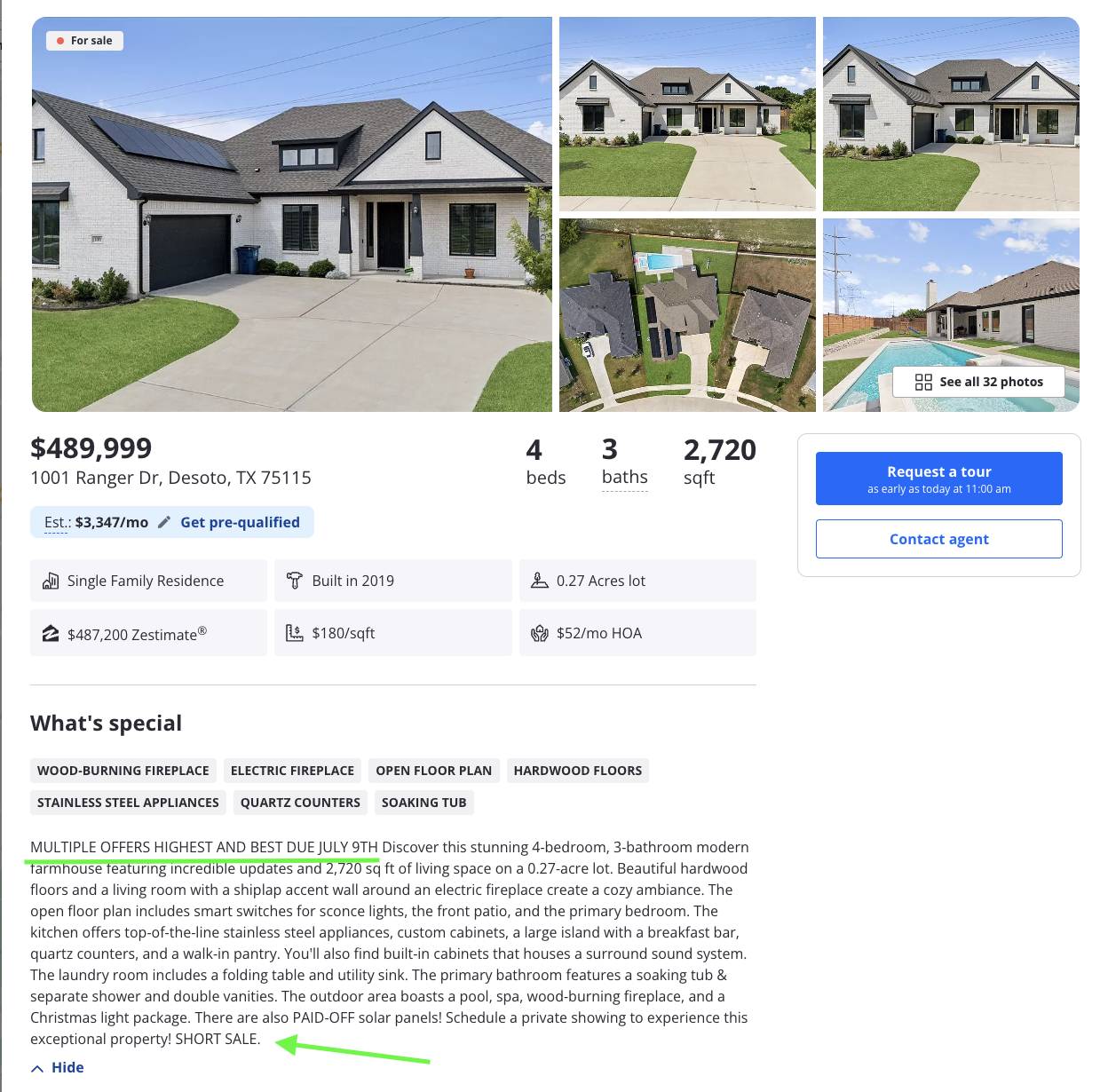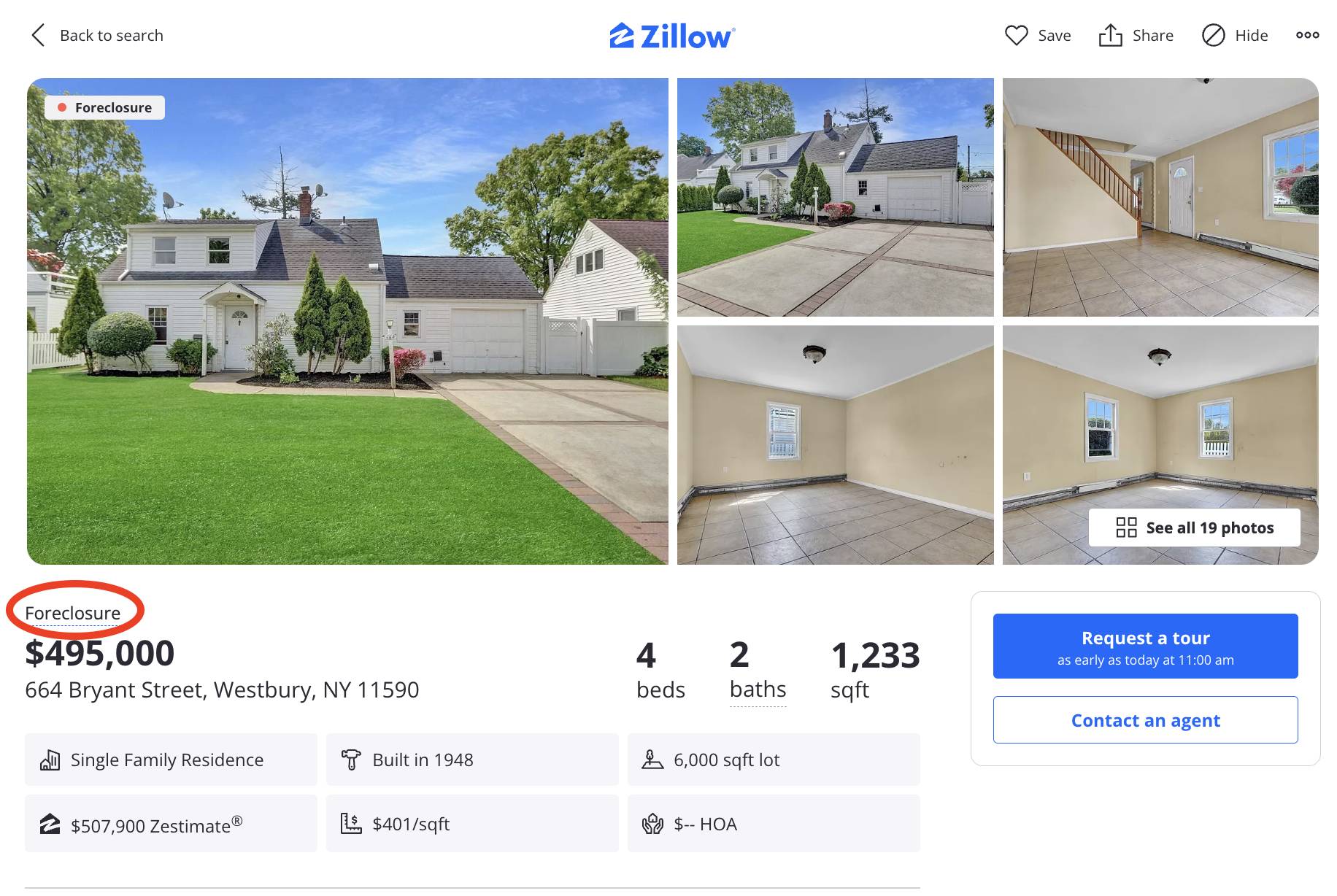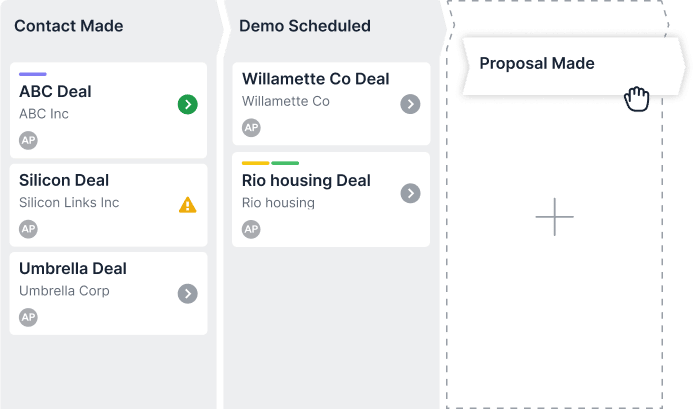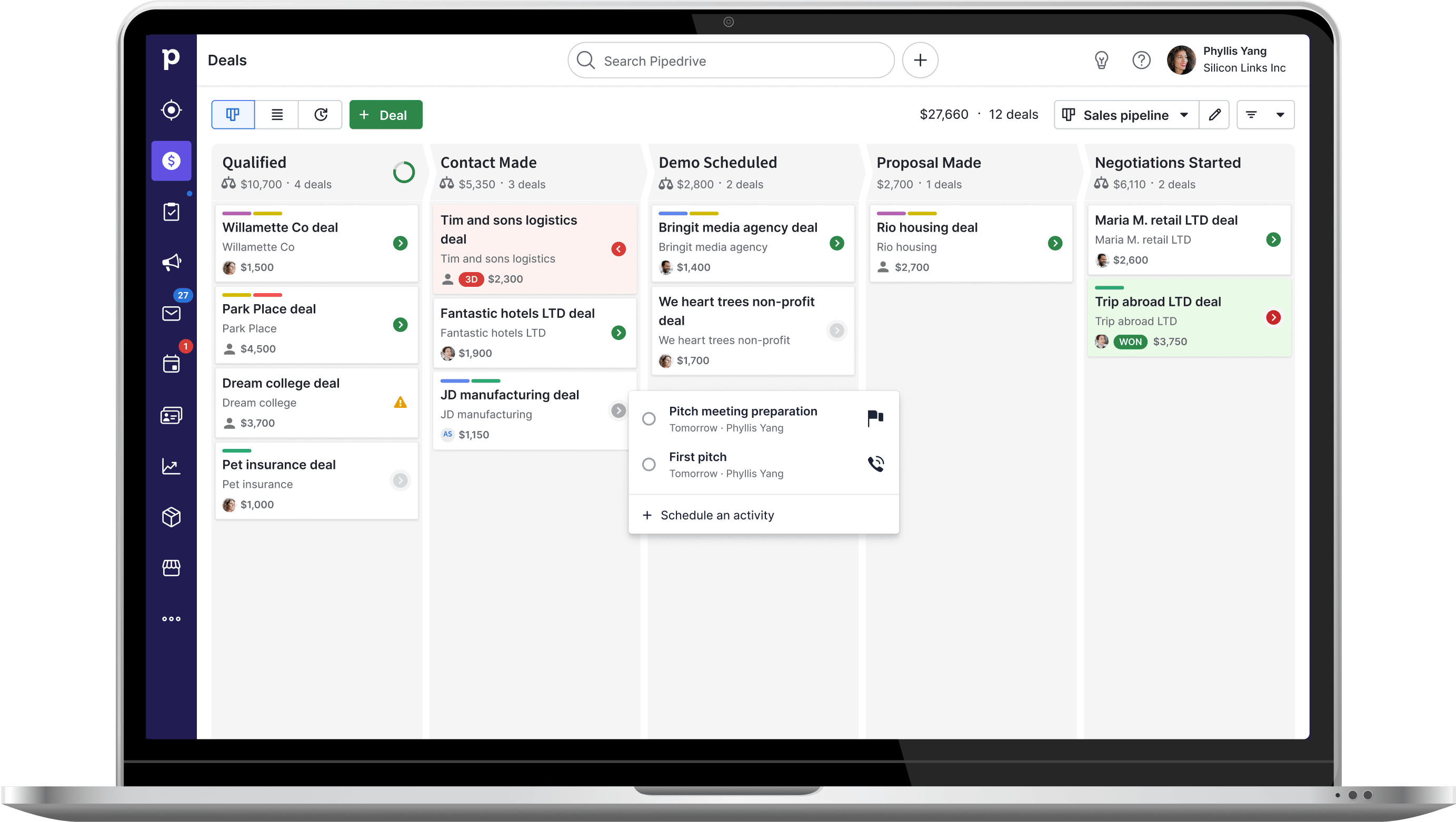Our view at Stack - Pipedrive is a robust CRM platform, offering automation, contact data collection, webhooks, AI-powered sales assistant, email communications, email marketing, and customisable sales pipeline workflows.
Short sales are a great investment for property developers who want high returns, but risks are also involved.
To take advantage of these below-market-value properties, you must understand the complexities of short-sale offers.
In this article, you’ll learn the clear definition of a short sale, how it works and how to minimize risk while maximizing returns.
What is a short sale in real estate?
Short sale meaning: A short sale (also known as a pre-foreclosure sale) is when a homeowner sells their property for less than the outstanding mortgage balance. Typically, the homeowner can no longer afford their loan payments, and the property’s market value has declined.
Short sales are a great way for investors, developers and home buyers to find deals on properties. However, they can also be time-consuming and complicated due to lender approval processes.
Recommended reading

What is sales? Everything you need to know
Here’s an example of a short sale property in Texas:

These properties often sell at a discount, allowing investors to buy them for a lower price. After making necessary repairs or renovations, investors can sell the house and make a profit (called “flipping”).
Short sale opportunities often occur during economic downturns or when housing markets in an area decline. Capitalizing on someone else’s financial troubles might seem harsh, but purchasing a property this way helps the seller avoid foreclosure while you gain a potential bargain.
Short sale vs. foreclosure
A short sale is a voluntary agreement or mutually agreed upon contract between the homeowner and the lender.
By contrast, a foreclosure happens when the homeowner cannot fulfill their repayment obligation, and a lender seizes the property. The lender will try to recoup losses by reselling the property at a discount.
Here’s an example of a foreclosure property in New York.

Short sales can help homeowners avoid the foreclosure process or a deed in lieu of foreclosure. They also have a less severe credit impact since foreclosures stay on a credit report for seven years.
Short sales and foreclosures can involve competitive bidding through auctions or multiple offer scenarios. They may also require dealing with property damage or neglect from previous owners who faced financial distress.
Both processes involve risk and can be more complex than buying properties marketed through agencies. However, the profit reward can pay off.
It’s up to you to decide how much risk you’re willing to take on and how much time and energy you will invest to secure the deal. Before you decide, you should understand the ins and outs of short sales.
Recommended reading

6 pipeline management tips for real estate agents
How does a short sale work?
A short sale is a complex process involving multiple steps and parties. As with any home, you must find and view the property. However, if maximizing profit is the aim, you should conduct a thorough review and submit a strategic offer.
Here’s a simplified overview of the short-sale process.
Find potential short-sale properties
Property developers and investors can use multiple channels to find potential short-sale opportunities as part of their real estate prospecting strategy.
They include:
-
Networking with real estate agents specializing in neglected properties
-
Looking for listings labeled as “short sale”, “loan modification pending” or “subject to bank approval” as an indication of potential bargain properties
-
Building relationships with local banks and lenders who may have pre-foreclosure listings
-
Using public records to find properties with notices of default or bankruptcy filings
Combine these approaches to create a pipeline of potential short-sale opportunities, which will help you act quickly when promising properties become available.
Conduct due diligence
Performing due diligence on a potential short-sale property involves investigating its financial viability, physical condition and legal status. It’s a crucial step in the real estate sales process for short sales.
Property developers use this period to make informed investment decisions, negotiate favorable terms and mitigate potential risks, such as unforeseen expenses or legal challenges.
Here are some areas to focus on:
-
Property valuation. Get an independent appraisal to determine the property’s fair market value and compare it to the mortgage balance.
-
Financial analysis. Understand the seller’s personal finance situation, including income, mortgage debts and outstanding liens, to determine why they want to short sale.
-
Potential rental income. If you plan to rent the property, research the local rental market to estimate potential rental income. Consider factors like property size, location, condition and amenities.
-
Operating expenses. Estimate ongoing expenses like property taxes, insurance, maintenance and property management fees.
-
Property inspection. Look for structural problems, deferred maintenance or needed repairs and factor these into the investment analysis.
-
Title search. Ensure the title doesn’t have restrictions or legal disputes that could halt the sale.
-
Exit strategy analysis. Consider your post-acquisition plans and whether you’ll sell or rent (“buy and hold”) the property. Research the target market to ensure it aligns with local demand.
A thorough due diligence process helps you make a sound investment decision, negotiate a fair price and set realistic expectations for the property’s potential. You can then prepare and submit a competitive offer.
Prepare and submit the offer
Your offer is your formal bid for the property. A strong offer confirms your intent and makes you a more attractive buyer than those with weaker offers.
This step is often the most time-consuming. Your offer requires careful attention to meet both the seller’s and lender’s requirements.
Gather financial documentation, research the market and consult with real estate professionals to create a competitive and compliant offer.
Many things go into an offer package, and some agents might have specific requirements about what to include, like:
-
A competitive purchase price
-
Proof of funds or a pre-approval letter
-
A detailed purchase agreement with clear contingencies
-
Your proposed timeline for closing
Once you’ve assembled your package, submit it to the listing agent. They’ll present it to the seller, and if accepted, it will move on to the lender for review.
This stage could involve multiple rounds of negotiation. Potential buyers may need to increase their offers to meet the lender’s minimum acceptable sale price.
Wait for the lender to review the offer
Wait while the homeowner sends the accepted offer to the lender for review. The lender assesses the offer and the property’s current market value.
Lender reviews can take weeks or even months. Be patient but ready to respond quickly to counter-offers or requests for additional information. Given these potential delays, investors often submit multiple offers to save time and money while waiting for a response.
In cases with multiple lenders (also called lienholders), each lender must approve the short sale, adding further complexity to the process.
Use this waiting period to refine your development plans and task management. Research contractors, obtain preliminary estimates for renovations and explore potential exit strategies (e.g., resale vs. rental).
If home values increase during the short sale process, the mortgage lender may reassess the situation.
They might reject the short sale if they believe they can recoup more through foreclosure or request a higher offer price to reflect the new market value. In rare cases, the homeowner might regain enough equity to avoid a short sale altogether.
As a buyer, you can prepare for this scenario by:
-
Building some flexibility into your budget
-
Maintaining open communication with the listing agent
-
Being ready to walk away if the new terms no longer make financial sense for your investment strategy
While rising property values can complicate a short sale, they also indicate a strengthening market, which could benefit your long-term investment strategy.
Close the sale
Closing a short sale requires quick action and thorough preparation. Once the lender approves, be ready to move quickly with your financing.
Have a team of professionals (e.g., real estate agent, attorney, title company) prepared to handle the additional scrutiny and documentation often involved in short sales.
The closing process follows standard real estate procedures but with extra conditions set by the lender, including:
-
The buyer paying certain fees (e.g., property appraisal costs, title search fees or lender processing charges)
-
The seller signing an affidavit of “arm’s length transaction”, a legal document where the seller agrees not to profit from the sale and confirms that the transaction is between unrelated parties
-
Additional paperwork or documentation (e.g., an “as-is” property condition agreement, a contents agreement or disclosure forms)
All parties must follow the lender’s conditions for closing the sale. After completion, the lender accepts the proceeds as full repayment for the mortgage, releasing their claim on the property.
This process may involve canceling any ongoing attempts at refinancing or loan modification.
Recommended reading

Sales funnels: definition, process, stages, template and examples
Benefits of a short sale
Short sales can be particularly attractive in certain market conditions or for specific investment approaches.
While they require more research and patience than a traditional sale, the potential benefits can be significant.
Here are several ways a short sale can benefit property investors:
-
Profit potential. Lenders focus on recovering their investments rather than maximizing profit. You can get a property for much less than it’s worth to the market.
-
Reduced competition (sometimes). Short sales may deter buyers because of their perceived complexity and longer timeline – reducing your competition with other home buyers or at foreclosure auctions.
-
Lower risk. Short-sale homes can often be in better condition than foreclosures (though that’s not guaranteed). Since the homeowner is usually still living in the house, they’re motivated to maintain it at a livable level.
-
Highly motivated sellers. A seller’s primary goal in a short sale is to avoid foreclosure, which could damage their credit score. Understanding the seller’s situation can help you negotiate terms that work for both parties, potentially including a lower price or repair assistance.
While these benefits make short sales attractive, it’s also important to know the risks involved.
Recommended reading

13 real estate cold calling scripts to increase lead generation
Risks of buying a short-sale home
Short sales can be great deals, but they come with challenges. These risks can affect the length of your investment, the amount of money you make and the overall success of your project.
Here are some important risks to think about.
| Short sale risk | Description |
| Longer waiting periods | The lender approval process can be lengthy and unpredictable. You may need to wait weeks or even months for a decision, and there’s no approval guarantee. It can be frustrating for buyers who need to move quickly or have tight timelines. |
| Potential for repairs |
While short-sale homes may be in better condition than foreclosures, they might still require significant repairs or renovations. Homeowners sometimes neglect maintenance due to financial constraints, and lenders may not allow repairs before the sale. Inspect the property and factor potential repair costs into your budget. |
| Lender negotiations |
Lenders may reject your initial offer, counter with a higher price or request additional documentation. Even if your offer package is comprehensive, prepare for multiple rounds of negotiation and potential setbacks. |
| Deficiency judgments |
In some states, lenders may be able to seek a deficiency judgment against the seller if the short sale proceeds don’t cover the entire mortgage debt. For example, if the lender approves a short sale for $400,000 but the mortgage balance is $450,000, some lenders may attempt to recoup the $50,000 from the seller. While this doesn’t directly impact the buyer, it’s essential to be aware of this potential complication and reflect it in the short sale agreement if necessary. |
| Junior liens |
Suppose the property has junior liens (secondary mortgages or other debts secured by the property). In that case, negotiations and settlements can add time and complexity to the transaction, delaying the close of the short sale. |
| Tax implications |
Short sales can have tax implications for both buyers and sellers. Sellers can often consider forgiven debt taxable income. Buyers may receive potential tax benefits depending on individual circumstances. Both parties should seek guidance from professionals on the specific tax consequences of their situation. |
Keeping all these issues in mind during a short sale will help the process go more smoothly
Recommended reading

5 best mortgage CRM software for client management options
5 proven short sale strategies
Short sales aren’t the right move for everyone, but they can be quite lucrative with the right approach.
Let’s look at some tried and true strategies for making the most of short sales.
1. Prioritize thorough home inspections
In traditional sales, sellers might make repairs to secure a higher price. However, many short-sale sellers may have limited financial means to address pre-existing issues.
As a result, the property’s condition is often “as-is” – meaning you inherit any problems or defects after the home purchase.
Hiring a certified inspector who has experience with homes in financial trouble can help mitigate this risk.
In this case, the inspector would examine areas like:
-
Foundation and structural integrity
-
Roof condition and remaining lifespan
-
Electrical systems, including wiring and panel capacity
-
Plumbing, including pipes, fixtures and water pressure
-
Heating and cooling system efficiency and age
-
Presence of mold, asbestos or lead paint
-
Pest infestations or damage
-
Window and door functionality
-
Drainage and grading issues
-
Exterior siding and trim condition
Some homes have obvious or stated concerns. In this case, consider bringing in specialists to handle these areas.
For example, you may need a structural engineer to check out large cracks or a roofer to conduct a detailed assessment of the repairs needed.
The inspection report covers the property’s overall condition and possible risks. It then helps you decide whether the property is worth the investment, even with the potential repair costs.
You can use these findings to negotiate with the lender. Request a price reduction to cover the cost of repairs or ask the seller to address specific issues before closing.
2. Budget for additional and unexpected costs
Unexpected or additional costs may arise with any property purchase. Budget for these potential expenses to ensure your investment is profitable.
Short sales are especially tricky because the seller’s financial situation makes the property’s condition uncertain. As with most property sales, lenders typically don’t cover repairs or offer concessions in short sales.
Some unexpected costs that can pop up include:
-
Hidden repairs like outdated electrical systems or plumbing leaks
-
Closing costs like lender and attorney fees
-
Holding costs like property taxes, insurance, utilities and mortgage payments during the renovation period
-
Market fluctuation costs in case the property’s value declines
-
Title issues like undisclosed liens, boundary disputes or errors in public records that require legal intervention to resolve
How do you manage these unexpected costs?
There are a few ways you can manage these costs. Set aside part of your budget (10–20%) for unexpected repairs and expenses to avoid financial strain if problems occur.
Also, negotiate with the lender to cover some of the repair costs or closing fees. While this strategy isn’t always successful, it’s worth trying to reduce your financial burden.
Lastly, get multiple quotes before starting any renovations. Obtain estimates from several contractors to ensure you’re getting fair pricing.
3. Secure short-sale home financing early
Pre-approval for a mortgage shows sellers and their lenders your financial commitment. When you make an offer, you will also have a clear budget, which can speed up the closing process.
Here are some tips for getting financing early as a borrower:
-
Compare interest rates and terms from multiple lenders to find the best deal for your situation.
-
Prepare all necessary financial documents like pay stubs, tax returns and bank statements.
-
Obtain a pre-approval letter from your chosen lender specifying the maximum mortgage loan amount.
-
Avoid making major financial decisions, changing jobs or taking on new debt until you finalize the short sale.
Short sales may take time to close, so ensure your pre-approval won’t expire before the deal closes or renew it if necessary.
4. Prepare an attractive offer package
In competitive markets, you may face multiple offers on a short-sale property. To stand out, put together an offer that shows your commitment to close the deal.
Here are some tips for compiling an offer that rises above the rest:
-
Submit your highest and best offer upfront, backed by a thorough Comparative Market Analysis (CMA) to justify your price.
-
Minimize contingencies in your offer to make it more attractive to the seller and lender.
-
Include proof of funds, like recent bank statements, a letter of credit or a solid pre-approval letter if financing.
-
Provide a detailed investor profile, including your experience, past successful projects and references.
-
Write a letter to the lender and seller explaining your development plans.
-
Include a realistic timeline for the purchase process and any necessary repair estimates.
Flexibility is also key. Your offer package may be robust but is subject to tweaks and requests by the seller. Be prepared to adjust your offer or timeline if needed.
Spend More Minutes Selling With These Time Saving Sales Hacks
Take control of your workday with these time saving sales tactics that will focus your meetings and calls, and help you tackle admin tasks.
5. Hire short sale experts
Short sales are complex and time-consuming. Assemble a team of professionals specializing in short-sale transactions.
Professionals know how to negotiate with lenders, handle complicated paperwork and spot potential legal issues. Experts save you time and money while increasing their chances of closing.
You’ll want these experts on your team:
-
Real estate agent. A realtor with short sale experience understands the intricacies of the process, is familiar with lenders and can negotiate on your behalf.
-
Real estate attorney. A real estate attorney provides legal guidance, reviews contracts and protects your interests throughout the sale of the property.
-
Financial advisor. A financial advisor can help you assess the risks and rewards of the investment, develop a financial plan and ensure you’re making a sound decision.
-
Title company. A title company checks the property for liens, judgments and other claims. It also handles the closing process and transfers the title.
-
Short sale negotiator. A short sale negotiator communicates with lenders on behalf of buyers. They have expertise in short sale regulations, lender guidelines and negotiation tactics. Often, they can get you better terms, handle any issues with the lender and speed up the approval process.
Having these experts on your team will make dealing with short sales much easier. At the same time, even with their help, you still need to stay involved and be ready for potential challenges.
Recommended reading
CRM Email Tracking & Communications
Tracking your short sale offers in a CRM
Managing multiple short-sale offers can be overwhelming. Luckily, you can track all your offers easily with software.
For example, to organize your offers and projects, include a Customer Relationship Management (CRM) system like Pipedrive in your real estate sales stack.
Here are some tips when using a CRM for short sales.
Create customizable pipelines
Choose a CRM that allows you to create pipeline stages that fit your property business. For example, Pipedrive’s flexible pipelines allow you to tailor stages to mirror the unique short-sale buying process.

Create stages like:
-
Lead. Identifying a potential short-sale property.
-
Research. Conducting a careful investigation of the property.
-
Offer Submitted. Submitting your offer to the seller and lender.
-
Negotiation. Engaging in back-and-forth negotiations with the lender.
-
Approved/Rejected. Getting the final decision from the lender.
-
Closing. Finalizing the transaction and transferring ownership.
This visual representation helps focus efforts where they’re most needed and spot bottlenecks in your process. You can monitor offers and manage contacts, so all your information is in one place.
Enable follow-up notifications
Short sales can stall at various stages. Set up automatic reminders to follow up on offers that haven’t progressed.
For example, you might want to:
-
Set a notification for two weeks after submitting an offer if you haven’t heard back
-
Create an alert if a deal has been “under review” for over a month
In Pipedrive’s CRM, it could look like this:

These prompts ensure no potential deal falls through the cracks due to lack of follow-up.
Use advanced reporting
Use the CRM reporting features to gain insights into your short-sale investing strategy.
With a CRM, you can get real-time information about:
Busy investors have multiple projects to manage on the go, so having this information in an intuitive dashboard is critical.
Pipedrive’s dashboards make analytics easy. You can see a high-level overview of your projects and get granular details on all your activities.

Export your reports to share with partners, lenders or your investment team. Use these insights to refine your strategy over time and simplify business growth.
Recommended reading
Commercial Real Estate CRM Software
Buying a short sale property FAQs
Final thoughts
Managing the short sale process can lead to potential bargains and open doors to unique properties.
If you’re an investor or developer searching for the best approach to managing short sales, try Pipedrive’s CRM. Track multiple properties, manage negotiations and automate follow-ups so you can spend more time on high-priority tasks like evaluating properties and closing deals.
Start your free trial of Pipedrive today and see how it can streamline your short-sale investment process.
If Pipedrive is of interest and you'd like more information, please do make contact or take a look in more detail here.
Credit: Original article published here.
